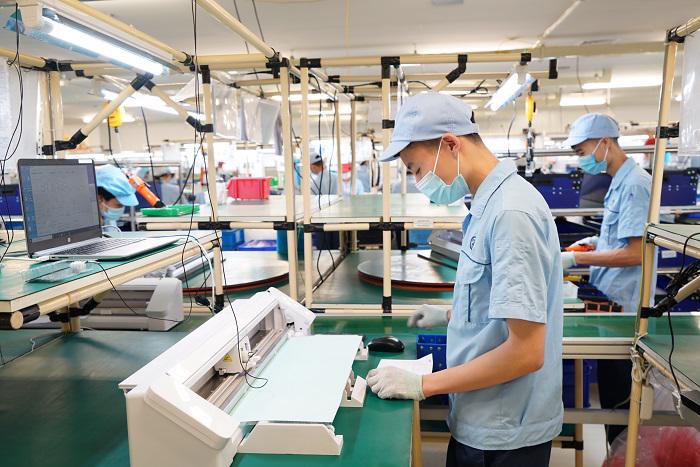Vietnam's FDI outlays in 10 months jump 15% to exceed $17 billion
The total FDI disbursement in Vietnam this year is projected to hit $21-22 billion, up 6.4-11.5% year on year.
The disbursement of foreign direct investment (FDI) in Vietnam during the ten months rose by 15% year on year to US$17.45 billion.
| Production at Rhythm Precision Vietnam in Noi Bai Industrial Park. Photo: Pham Hung |
"This brings real FDI to about $21-22 billion this year, up 6.4-11.5% year-on-year," according to the Foreign Investment Agency under the Ministry of Planning and Investment.
The FDI commitments declined by 5.4% during the period to over $22.4 billion.
In the first ten months, 1,570 new projects have been approved with total registered capital of around $10 billion, up 14% in the number of projects but down 23.7% in capital year-on-year.
Meanwhile, 880 existing projects have been injected an additional $8.74 billion, up 13.4% in number and 23.3% in the capital, while 2,997 projects had nearly $3.79 billion contributed by foreign investors, which was down 2.2% across several projects, but up 4.5% in value year-on-year.
Investors poured money into 18 of 21 economic fields and sectors in the ten months. Manufacturing and processing led the pack with investment capital of over $12.9 billion, accounting for 57.5% of total registered capital. Real estate came second with $3.87 billion, or 17.2%, followed by electricity production with $928 million.
The report added that out of 103 countries and territories registering projects in Vietnam in the first ten months of 2022, Singapore took the lead with $5.34 billion, or 23.8% of the total newly registered FDI projects, followed by Japan with $4.19 billion, or 18.7%, and South Korea with US$3.9 billion, or 17.4%.
Among 54 cities and provinces having received FDI in the period, Ho Chi Minh City has attracted the most significant portion of commitments with $3.42 billion, or 15.2% of the total. Binh Duong ranked second with over $2.85 billion (12.7%), followed by Quang Ninh with $2.19 billion (9.7%).
The World Bank, in a recent report, pointed out that a decline in FDI commitments to Vietnam reflects the heightened uncertainty associated with global economic prospects and the tightening financial conditions to fight inflation in advanced economies.
But a higher disbursed FDI showed the confidence of foreign investors in the country's economic outlook.
EuroCham Chairman Alain Cany said Vietnam continues to become attractive for foreign investors, as this remained a central pillar for the country's growth.
"I can see that in the investors' minds, Vietnam has become not only a country of cheap labor but a country for sustainability, development, and investment," he told The Hanoi Times, noting many are now considering the country as a more long-term place for investment.
Cany referred to recent significant investments from European companies in Vietnam, like Lego, which is planning to build a zero-carbon factory with an investment capital of nearly $1 billion in the south.
In a recent meeting with Prime Minister Pham Minh Chinh in September, the Chief Representative of the Japan External Trade Organization (JETRO) in Hanoi, Takeo Nakajima, said that 55% of Japanese businesses are planning to expand operations in Vietnam, the highest rate among ASEAN countries.
Hanoi remains attractive to FDI investment
In October, Hanoi attracted 21 FDI projects with a total investment capital of $2.7 million, while 22 existing projects have seen an injection of $237.1 million, and foreign investors contributed $20 million to 30 projects.
Overall, over the ten months, the city attracted $1.28 billion FDI, a surge of 27% year on year.
The municipal Department of Planning and Investment noted the city plans to promote investment capital from major markets such as Japan, South Korea, Singapore, Taiwan (China), China, the US, and Europe.
In line with such an effort, Hanoi would continue to invest in infrastructure development and training a high-quality workforce to meet rising demand from foreign investors.











